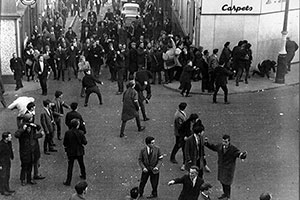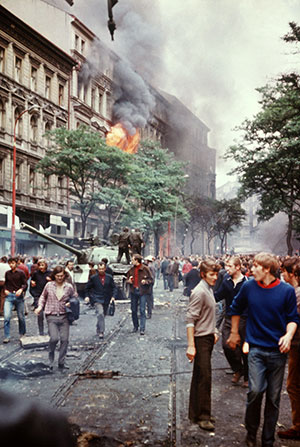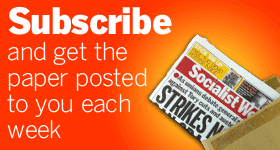
The year 1968 was a watershed in world history. Mass movements shook governments to their foundations. People on opposite sides of the globe took inspiration from each other’s struggles.
Challenges to authority exposed what the overtly capitalist West and the Stalinist dictatorships of the Eastern Bloc had in common—and pointed towards the alternative to both.
US imperialism was humbled by the resistance in Vietnam—and by riots at home after the assassination of Civil Rights leader Martin Luther King.
Students tore up the streets of Paris to build barricades and throw cobble stones at police. Within days ten million workers had joined them in a general strike.
And working class protesters in Poland denounced those who ruled them in the name of “socialism” with chants of “Down with the red bourgeoisie”.
In Britain too universities and colleges went into occupation. And students were part of the 100,000-strong march on the US embassy in Grosvenor Square.
Revolt was contagious in 1968, and this was no coincidence.
Capitalism across the world had gone through an unprecedented boom after the Second World War. But by the late 1960s that boom was reaching its limits, sapping the legitimacy of the system.
Working class people had been told that—as Britain’s Tory prime minister Harold Macmillan put it in 1957—they’d “never had it so good”. Now they wanted more, but the elite were unable to deliver.
And society was changing, for example through mass immigration and more open attitudes to sex.
The establishment struggled to keep up, either resisting reforms or conceding them only to fuel demands for more. In Britain the abortion, divorce and homosexuality reform acts were all passed in 1967 and the first law against racist discrimination in 1968.
As radical movements grew, millions of people began to hope for revolutionary change.

Riots in Derry in 1968 Credit: PA
Alternative
At the time much of the left and workers’ movements in the West still looked to Russia and the Eastern Bloc as a socialist alternative to Western capitalism.
But this was challenged—most significantly by the “Prague Spring”.
The Communist Party of Czechoslovakia began a reform process designed to kick-start its stagnant state capitalist economy, but it also gave people more space to question their rulers.
When Russian tanks rolled into Czechoslovakia to crush these gains, many protesters in the West had to rethink which side they were on. They had more in common with Czechoslovak workers and students than with the Russian army.
At the same time movements in the West were radicalising. After King’s assassination, for example, a new generation of young black activists began to look to Black Power and the revolutionary Black Panther Party.
The International Socialists (IS), forerunner of the Socialist Workers Party, was part of a new left that sought a revolutionary alternative to both power blocks.
As Chris Harman, then a student at the London School of Economics, wrote in Socialist Worker, “In Chicago police, supported by troops with fixed bayonets, mercilessly beat up peaceful demonstrators.
“In Prague, tanks patrol the streets while the Russian rulers boast of their intention to ‘liquidate 20,000 counter?revolutionaries’.
“There are important differences between American and Russian society, between the ‘free world’ and the ‘socialist world’.
But both are controlled by small ruling classes that use the resources of modern technology to keep down the workers who may threaten their rule.

Russian tanks in Prague Credit: PA
“It proves that they at least recognise the power that will be exercised when the mass of working people begin to take control of their own lives.”
Inspiration
Millions of people now looked beyond the fake socialism of Stalinist Russia.Some took inspiration from Mao Zedong’s China, Fidel Castro’s Cuba or the different national liberation movements in the Third World.
But there was also an opening for groups such as the IS to revive Karl Marx’s definition of socialism as the self-emancipation of the working class.
1968 is often seen as a student revolt—and student movements did play a key role (see below). But those who disregarded the potential of workers had an almighty shock.
Trendy left wing academics and thinkers had dismissed the Western working class as having been bought off by higher living standards during the long boom.
Harman summarised a Fabian Society pamphlet as claiming that “semi-detached houses complete with garden gnomes had ‘embourgeoisified’ groups like car workers.”
But May 1968 in France saw what was then the biggest general strike in human history—with factory occupations, and in some cities, workers’ committees organising fuel and food supplies. The years that followed saw the workers’ movement make dramatic gains in Britain and Italy.
1968 wasn’t just a shift to the left. The right and the ruling class fought back with bloody repression and racist scapegoating—Tory Enoch Powell made his infamous “Rivers of Blood” speech. And the revolts didn’t fundamentally transform society. Even in France, president Charles de Gaulle was able to regain the upper hand and decisively win a general election in June.
Reformist leaders in the Communist Party and union bureaucracy had agreed to end the fight in exchange for large pay rises and a greater say in future negotiations.
Many workers were furious, but the genuine revolutionary left was not large or strong enough to win the argument against retreating.
There is always a battle for leadership within a movement. Some will fight hard for changes—but will shy away from confronting capitalism itself. But the clock couldn’t be rolled back completely. Movements against war, racism and women’s oppression won gains that we’re still defending today. They should inspire us to go further next time, and turn revolt into revolution.
The birth of a global struggle
Internationalism and solidarity were at the heart of 1968.

Protesting against the Vietnam War in London in 1968
The year had barely begun when in Vietnam the National Liberation Front (NLF) or “Viet Cong” resistance showed it was possible to challenge US imperialism.
And the horror of the US occupation was laid bare to US audiences in televised footage of a South Vietnamese general executing NLF fighter Nguyen Van Lem.
Vietnamese resistance raised the question of international solidarity to the Civil Rights Movement and student movement in the US. In October 1967 over 100,000 had already marched on the Pentagon. And in 1968 the top Ivy League universities went into occupation.
NLF officer Bui Tin later said the US anti-war movement “was essential to our strategy”.
“Support for the war from our rear was completely secure while the American rear was vulnerable,” he explained.
“Every day our leadership would listen to world news over the radio at 9am to follow the growth of the American anti-war movement.”
Mexico City hosted the Olympic Games in October 1968.
On the winners’ podium, black US athletes Tommy Smith and John Carlos raised their black-gloved fists in defiance during the US national anthem. A few weeks earlier thousands of Mexican students had marched outside the stadium against the Mexican military’s occupation of the National Polytechnic Institute (NPI).
The state responded by killing hundreds of students in the Plaza de las Tres Culturas.
One week before the massacre, cops in Northern Ireland beat a march for Catholic civil rights off the streets of Derry in British-occupied Northern Ireland. Mickey Devine, who would later be one of the last hunger strikers in the 1980s, never forgot the Mexican students.
He championed their cause at meetings and rallies.
Students take the stage
For the first time students were at the forefront of the struggle. The post-war boom had seen universities that were previously the training ground of the elite expand and open up to middle and working class students.
In Britain the number of universities more than doubled from 22 to 45 in the 1960s. These became arenas for debating the state of the world—and for struggle.
The new crop of students rebelled against the elitism of the campus establishment and found common cause with oppressed people fighting racism and imperialism.
The revolt in Paris began with student protests for more freedom on campus, against dorms segregated by gender and against the Vietnam War.
Repression of those students spurred on others to act in solidarity. Workers, who had many of their own grievances, took inspiration from them.
Some groups on the New Left looked to build “student power”.
University campuses are less strictly controlled than workplaces, and revolts can often take off quicker there.
But students lack the power that workers’ role in the economy gives them. Without workers, students’ struggles can collapse as quickly as they arise.
Students played a heroic role in 1968, but the high point came when the working class entered the stage.
What happened when?
- 5 January—Alexander Dubcek becomes head of Czechoslovakia’s government and begins a “Prague Spring” of reforms that spur on growing dissent in the streets
- 30 January—Vietnamese resistance forces launch the Tet Offensive—a wave of surprise attacks against the occupying US army and its allies, temporarily driving them from key cities
- 1 February—The point blank execution of Vietnamese guerilla fighter Nguyen Van Lem is caught on camera, horrifying audiences in the US
- 11 February—Sanitation workers strike against racist discrimination in Memphis
- 15 March—20,000 young workers and students fight Polish security forces in Gdansk after protests snowball into a nationwide uprising
- 17 March—Around 100,000 students march on the US embassy in London’s Grosvenor Square to oppose the war on Vietnam
- 4 April—Martin Luther King is shot dead by a sniper in Memphis. Riots explode in 11 cities across the US
- 11 April—Assassination attempt on German student activist Rudi Dutschke, labelled a “public enemy” by the Bild Zeitung newspaper. Students block deliveries with protests and clashed with the police
- 29 May—President Charles de Gaulle flees France, where ten million workers are on strike and dozens of factories are occupied
- 21 August—Russian tanks and 200,000 troops invade Czechoslovakia to topple Dubcek’s government
- 2 October—Bodies pile up in Mexico City as police and the army slaughter hundreds of protesting students after a summer of mass demonstrations
- 5 October—Two days of rioting erupt in Derry, Northern Ireland, after a march for Catholics’ civil rights is batoned off the streets by the Royal Ulster Constabulary
- 16 October—Black US athletes Tommie Smith and John Carlos raise black-gloved fists from the podium during the US national anthem at the Mexico City Olympics






















 Follow us
Follow us Become a fan
Become a fan RSS Feed
RSS Feed
